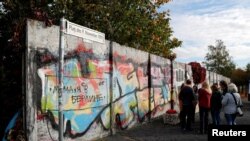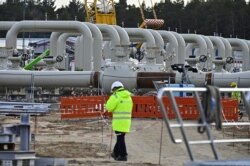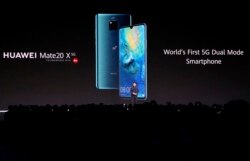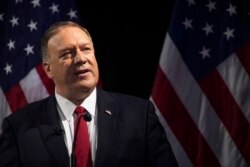The United States is warning a key European ally on growing threats from Russia, as Germany gears up to mark the 30th anniversary of the fall of the Berlin Wall.
Secretary of State Mike Pompeo is heading to Germany on Wednesday, three decades after the demolition of the wall, to underscore what U.S. officials say is the need for continuing a strengthened transatlantic partnership.
The top U.S. diplomat's meetings with leaders in Germany also come days after Denmark cleared one of the last legal hurdles to a proposed natural gas pipeline connecting Russia and Germany, known as Nord Stream 2.
A senior State Department official said the U.S. is concerned about the "energy security" for European partners, calling Nord Stream 2 "primarily a political tool" of Russia and "not a purely commercial project."
"Our concerns have been regularly expressed. We see this as a tool through which Russia seeks to use energy to advance Russia's geopolitical agenda," the official told VOA on Tuesday during a background briefing.
That official added Nord Stream 2 "jeopardizes" the priority of energy security by "making European countries and our allies more reliant on single country sources of energy."
Germany is Europe's largest natural gas consumer, as it produces very little energy domestically and is heavily dependent on imports. Officials there are downplaying U.S. concerns on security and geopolitics.
In another move seen as counter to U.S. warnings, Germany is not excluding Huawei Technologies, a leading telecom equipment vendor based in Shenzhen, China, from taking part in the rollout of Germany's 5G networks.
"We've urged all countries, particularly partners and allies, to carefully assess long-term impact of allowing untrusted vendors to have access to important 5G network infrastructure," the senior State Department official told VOA on Tuesday.
Bruno Kahl, the head of Germany's foreign intelligence service, recently told legislators that Huawei "cannot be trusted fully."
To address concerns, German Chancellor Angela Merkel insisted on a "no-spy" pact from Huawei as she decided to allow the Chinese telecom company to take part in the rollout.
Huawei CEO Ren Zhengfei has said his company would not share confidential user information, denying Beijing controls the company.
November marks 30 years since the fall of the Berlin Wall. The wall's demise brought an end to a divided Berlin, and symbolized the eventual liberation of East Germany, and later the rest of eastern Europe, from Soviet Communist rule.
Pompeo, who once served in Germany as a young Army officer, is visiting Grafenwohr, Vilseck, Modlareuth, Leipzig and Berlin to participate in events to commemorate the end of the Cold War.
In Leipzig, the chief U.S. diplomat will meet with German Foreign Minister Heiko Maas, discussing transatlantic partnership in the face of growing threats from Russia, China, and Iran, according to the State Department.
In Berlin, Pompeo is meeting with Chancellor Merkel and other senior officials to discuss areas of mutual cooperation and concern.
Pompeo will deliver a speech at Berlin's iconic Brandenburg Gate "on the continuing imperative to defend free nations and free peoples," said the State Department.







